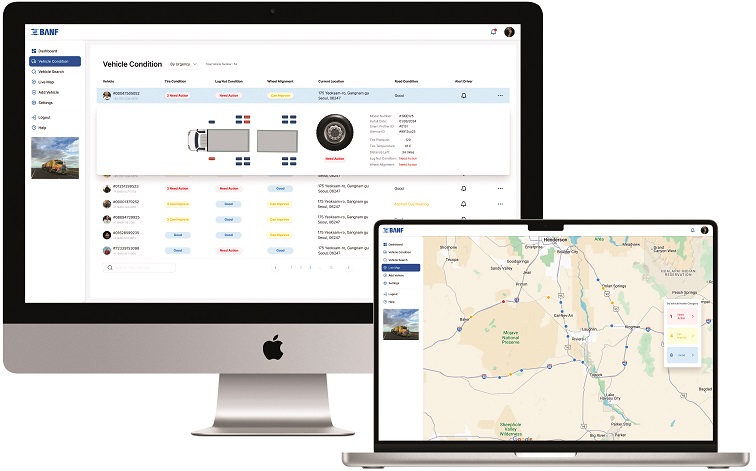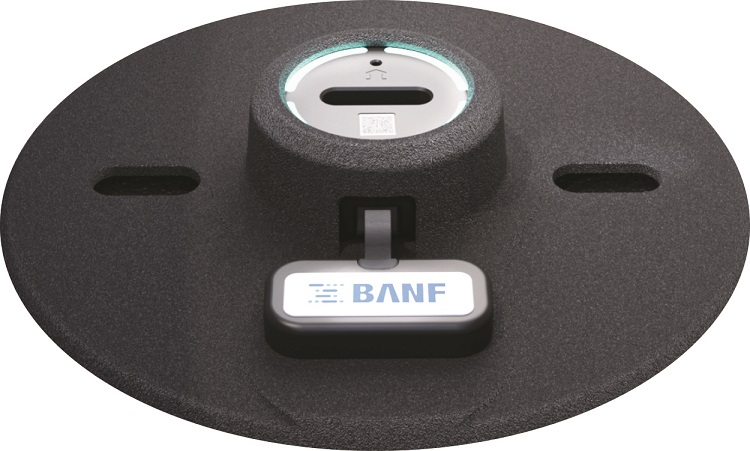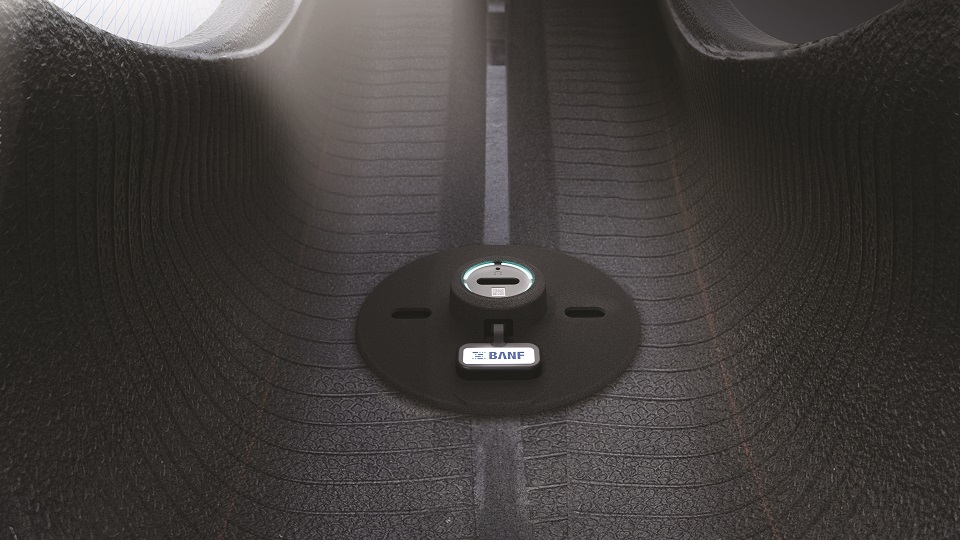- BANF
- tyre pressure monitoring system
- TPMS
- Ron Yoogun Lee
- Begin a New Future
- South Korea
- Volvo
- Hyundai
BANF Aims To Bring Real-Time Tyre Insights To Vehicles, Going Beyond TPMS
- By Nilesh Wadhwa
- January 08, 2025

South Korean start-up is transforming tyre safety by delivering real-time data insights that go beyond traditional TPMS, monitoring tyre pressure, temperature, wear and alignment. Targeted at fleet operators and manufacturers, BANF’s system improves vehicle safety, reduces costs and supports sustainability. With global partnerships including Volvo and Hyundai, BANF is also exploring market opportunities in India.
When it comes to vehicle safety and fuel efficiency, the role of tyres has often been underrated. Modern vehicles have undergone significant advancements over the decades, evolving from basic mechanical structures to sophisticated mechatronic and digital systems. However, for most, tyres remain largely unchanged – seemingly confined to the traditional black, rubber look without much technological upgrade.
The Tyre Pressure Monitoring System (TPMS), introduced in 1986 within high-end luxury cars, has yet to achieve global standardisation. Apart from a few countries where it is mandated, TPMS remains a novelty even in modern vehicles.
BANF (Begin a New Future), a South Korean start-up focusing on software and hardware technology to fully digitalise tyre information, is determined to change this. In an exclusive conversation with Tyre Trends, Ron Yoogun Lee, VP of Global Business Development at BANF, explains the company’s purpose:

“BANF was founded to address this critical need by integrating smart sensor technology and data analytics into tyre management. Our mission is to elevate vehicle safety, enhance tyre performance and reduce environmental impact through the digitalisation of tyre data. By providing real-time insights into tyre conditions, BANF empowers fleet operators, manufacturers and drivers to optimise maintenance, lower costs and promote sustainability. This drives us to tackle industry challenges with transformative solutions, pioneering a safer and more connected future for mobility.”
Expanding beyond basic TPMS capabilities
Lee explains that one of the primary limitations of current TPMS is its restricted data scope. Traditional TPMS sensors monitor tyre pressure at low frequencies, transmitting data every few minutes but focusing solely on air pressure.
BANF’s technology, however, gathers a wider range of tyre data, including pressure, temperature, tread wear, wheel alignment and even lug nut stability. This approach goes well beyond air pressure monitoring, providing insights that make tyres ‘smarter.’
Using machine learning, BANF’s system analyses the data to offer valuable insights to drivers and fleet operators regarding not only tyre health but also cargo load measurements and road surface conditions. The data is reportedly up to 90 percent accurate.
Lee details the core of BANF’s solution, which is built on two main components:
Tyre-Mounted Sensor (iSensor): A 3-axis accelerometer-based sensor attached (glued) inside the tyre’s inner liner, the only point of contact between the vehicle and the road.
Smart Profiler (Transmitter): Mounted on the mud flap or wheel arch and connected to the vehicle’s battery, this device wirelessly powers the sensor using magnetic resonance, gathering data on the tyre's internal and external conditions.

“Unlike standard TPMS, our system collects and analyses a comprehensive range of data points, offering real-time insights into tyre health and performance. This includes not only pressure but also factors such as temperature, tread wear and load, providing a more complete picture of the tyre’s condition,” he says.
BANF considers its unique selling point to be its advanced digitalisation and data analytics capabilities. The system empowers fleet managers, manufacturers and drivers to make proactive, data-driven decisions to enhance safety, optimise tyre performance and reduce maintenance costs. This comprehensive approach to tyre monitoring addresses the limitations of traditional TPMS, meeting the rising demand for safer, smarter and more efficient mobility solutions.
Continuous power and data collection
BANF’s technology enables continuous power supply to high-speed rotating tyres using resonant wireless power transmission. This allows the internal sensors to continuously collect data while driving, capturing 3-axis (X, Y, Z) accelerometer data to support advanced algorithm development. Additionally, BANF leverages mathematical modelling expertise to ensure high efficiency and minimal error in resonant wireless power environments.
Despite TPMS technology existing for over four decades, it still lacks widespread adoption. Why is that? Is it due to cost, awareness or maturity of the technology? Lee attributes the slow adoption of basic TPMS to limited consumer awareness and the system’s restricted functionality.

While TPMS provides basic air pressure information, it does not address other crucial aspects of tyre health, such as temperature, tread wear and load. This limited capability diminishes its perceived value, especially among consumers and manufacturers seeking comprehensive solutions.
“However, with the inevitable rise of electric vehicles (EVs) and autonomous vehicles (AVs), the demands on tyres are increasing. EVs, with their heavier batteries and higher torque, place additional stress on tyres, while AVs, designed for continuous operation, further amplify this strain. Traditional tyre monitoring methods, such as visual inspection, are inadequate for autonomous vehicles. As these trends reshape the automotive landscape, the need for advanced tyre monitoring systems that go beyond basic TPMS is growing. This shift will likely increase consumer awareness and drive the adoption of more comprehensive tyre monitoring solutions,” explains Lee.
While BANF may still be relatively unknown, the Korean start-up is already collaborating with major players like CampX by Volvo Group, Hyundai Motor Group, DHL and more than 20 other global organisations.
“Our primary target clients are fleet management companies operating commercial vehicles, particularly in the Truck and Bus Radial (TBR) segment. These clients benefit most from our advanced tyre monitoring solutions due to the significant return on investment (RoI) from optimised tyre usage, enhanced safety and reduced maintenance costs. By providing real-time insights into tyre health, we enable fleet operators to make data-driven decisions that minimise downtime and maximise efficiency. We currently produce 1,000 units monthly and are expanding our manufacturing capabilities,” shares Lee.
Plans for India and tyre safety
India, traditionally a cost-conscious market, has emerged as a major manufacturing hub and one of the fastest adopters of new technologies. In response to a question on BANF’s potential interest in India, Lee reveals:
“We are currently working with several companies in India, including major tyre manufacturers, vehicle manufacturers and last-mile fleet operators. We are supported by KISED, an arm of the Ministry of SMEs of Korea and NIPA, part of the Ministry of Science and ICT. We are actively engaging with stakeholders in the Indian innovation ecosystem and will be visiting India shortly to strengthen partnerships and explore further opportunities.”
Acknowledging India’s cost-sensitive market, Lee adds, “We are considering options for a facility setup worldwide, with India being one of our top choices.”
Road safety remains a priority for both the Indian automotive industry and the world. Despite numerous initiatives and technologies, the World Health Organisation (WHO) reports that 1.19 million lives are lost in road accidents each year. Road traffic injuries are the leading cause of death for children and young adults aged 5–29 years, with 92 percent of fatalities occurring in low- and middle-income countries.
Focus areas for tyre industry safety and efficiency
Lee identifies three key areas where the tyre industry can improve safety and efficiency:
1. Advanced Materials: Developing new tyre compounds that enhance durability and reduce rolling resistance can improve safety and energy efficiency. Lightweight, high-strength materials reduce energy loss and extend tyre life, crucial for EVs demanding lower energy consumption for longer range.
2. Intelligent Monitoring Systems: Smart sensors to monitor tyre health in real-time are increasingly essential. By tracking metrics such as pressure, temperature, tread wear and load, intelligent systems can alert drivers or fleet managers to potential issues before they escalate. This proactive approach enhances safety and fuel efficiency, as well-maintained tyres contribute to better aerodynamics and lower fuel consumption.
3. Sustainable Manufacturing: Optimising production to minimise environmental impact is crucial. Using eco-friendly materials, reducing waste and recycling tyres contributes to a more sustainable industry, aligning with global trends towards green manufacturing and supporting the energy efficiency goals of the automotive industry.
INTERVIEW: Ron Yoogun Lee
What are the upcoming key trends you see in the tyre industry?
One of the key trends in the tyre industry is the increasing emphasis on safety. As vehicles become more advanced, with a growing number of electric vehicles and autonomous vehicles entering the market, the demands placed on tyres are intensifying. EVs, for instance, have heavier loads and higher torque, which increase wear and tear on tyres, while AVs require consistent, reliable performance to operate safely around the clock. These factors are driving the need for smarter tyre solutions that go beyond traditional monitoring systems.

There is a growing demand for intelligent tyre technologies that provide real-time data on various parameters like pressure, temperature, tread wear and load. Such capabilities allow fleet operators, manufacturers and individual drivers to maintain tyre safety proactively, reduce maintenance costs and ensure optimal performance under diverse conditions. Meeting the advanced requirements of EV and AV clients is crucial, as their vehicles rely on enhanced tyre performance for safety and efficiency. As a result, the industry is moving towards digitalisation and smart sensors to address these evolving needs, marking a significant shift in tyre technology and monitoring.
What is BANF’s business plan (OE supplier), or you will also look at aftermarket opportunities?
BANF’s business plan primarily centres around building strong partnerships with Original Equipment (OE) manufacturers and OE suppliers. Our goal is to enhance tyre safety and efficiency directly at the manufacturing stage, ensuring that end customers benefit from high-quality, intelligent tyre solutions from the outset. Currently, our focus is on the commercial vehicle segment, where we see substantial demand for advanced tyre technology to improve safety, performance and operational efficiency.
That said, we also recognise the significant potential in the aftermarket sector and are actively exploring opportunities to expand into this space. The aftermarket offers us the chance to provide a wider range of products and services directly to end-users. By pursuing both OE partnerships and aftermarket avenues, we aim to deliver innovative tyre solutions that meet the evolving needs of our customers across the entire lifecycle of their vehicles.
What are the other products or areas that you would look to focus on?
Looking ahead, we still believe there is a lot can come out from tyre. We are currently developing many other advanced features to be announced soon. In a sense of product portfolio, we are looking into two-wheeler, three-wheeler market and also airplane tyres.
Discount Tire Earns Spot On Glassdoor's Best Places To Work 2026 List
- By TT News
- February 04, 2026

Discount Tire has earned a prominent position on Glassdoor's Best Places To Work 2026 list, ranking 14th in Consumer Services and within the top 100 US employers. This distinction is awarded to organisations with over 1,000 employee reviews on Glassdoor and a minimum rating of 3.5. For the Scottsdale-based retailer, with more than 1,250 locations nationally, the honour underscores a long-standing commitment to its workforce.
The company cultivates a people-first culture for its over 30,000 employees by providing substantial career growth, thorough training, leadership development and competitive benefits. This philosophy, centred on serving others and empowering personal goals, previously earned Discount Tire top Glassdoor rankings from 2018 through 2021. The latest recognition reaffirms its status as an employer dedicated to fostering a supportive and progressive workplace.
Dean Muglia, Chief Executive Officer, said, "We treat our people like family. We're honoured to be recognised by both current and former employees and Glassdoor as a best place to work. We strive every day to deliver the most inviting, easy and safe experience possible for our people and our customers."
Michael Zuieback, Executive Chairman, said, "Through six and a half decades of growth, our primary commitments have stayed true: We want to take care of people and help make more dreams come true.”
Radar Tyres Secures Strategic Multi-Year Partnership With Cricket South Africa
- By TT News
- February 04, 2026

Radar Tyres has entered a significant, multi-year global partnership with Cricket South Africa, a strategic move to build its brand within a sport enjoyed by a worldwide audience. This alliance grants the company headline sponsorship for the Proteas Men’s and Women’s T20 International sides, alongside associate partnership status for their ODI and Test matches. Radar will also be the headline partner for South Africa’s Under-19 national teams.
The collaboration provides substantial visibility, featuring exclusive logo placement on both match and training kits, with the new T20I apparel already unveiled. For Radar, this investment is a key step in leveraging high-profile platforms to enhance global brand recognition, all while maintaining its commitment to providing high-quality, value-driven tyre products.
G S Sareen, President and CEO, Omni United, said, "Becoming the Global Partner of the Proteas marks a significant milestone in Radar Tyres' global brand journey and reflects our belief in sport as a powerful platform to build brand equity, strengthen dealer support, enhance trust and credibility and connect with households worldwide. Through this partnership, we are able to engage with cricket fans both locally and globally while reinforcing Radar Tyres' as a reliable, performance-driven brand committed to delivering premium-performance at an accessible price point."
Pholetsi Moseki, Chief Executive Officer, CSA, said, "CSA is extremely proud to partner with Radar Tyres, an organisation that shares our values and commitment to excellence. This partnership is a significant milestone, securing support not only for our senior teams but for our junior teams as well. This partnership reflects our deliberate approach to working with like-minded organisations, guided by a long-term vision of developing the game, supporting our players and delivering memorable experiences for fans. Radar Tyres' support also reinforces CSA's commitment to excellence and inclusion, strengthening our ability to drive high performance across all levels."
AZuR Shortlisted For German Award For Sustainability Projects 2026
- By TT News
- February 03, 2026

For the second consecutive year, the Alliance for the Future of Tyres (AZuR) has been shortlisted for the German Award for Sustainability Projects, following its 2025 win. This renewed nomination underscores the jury’s recognition of AZuR as a pioneering force in sustainability, particularly for its dedicated efforts to advance tyre retreading as a core component of a circular economy. The 2026 award ceremony will be held under the patronage of Brigitte Zypries on 17 September in Berlin.
AZuR’s multifaceted initiative extends well beyond theoretical advocacy. Its work gained significant international attention with the Retreading Summit, held in September 2025 at KRONE Trailer in Werlte. This event convened experts from industry, politics, academia and media for two days of intensive dialogue on the potential, challenges and necessary policy frameworks for tyre modernisation, leading to the launch of concrete action plans. Furthermore, the alliance drives progress through strategic communications and direct support for flagship projects, such as the new passenger car tyre retreading facility established by Rigdon in Pfaffenhofen.
Central to AZuR’s mission is transforming public perception by demonstrating that worn tyres are valuable resources, not waste. Through ongoing awareness campaigns, it highlights the substantial ecological and economic benefits of retreaded tyres, which can be refurbished multiple times to conserve raw materials, reduce climate impact and offer cost-effective solutions. The German Award for Sustainability Projects, judged by a panel chaired by Prof Dr Claudia Kemfert of DIW Berlin, evaluates entries based on their innovation, impact and relevance to a sustainable future. AZuR’s repeated shortlisting affirms that its model for a tyre circular economy is a replicable and exemplary system with groundbreaking potential.
- Manish Maharaj
- Balkrishna Industries Ltd
- BKT Tyres
- Apollo Tyres Ltd
- Tyre Industry
- Business Finance Leadership
Manish Maharaj Joins BKT Tyres as GM & Head of Business Finance
- By Sharad Matade
- February 02, 2026

Seasoned tyre industry executive Manish Maharaj has embarked on a new professional chapter, joining Balkrishna Industries Ltd (BKT Tires) in a senior leadership capacity after a distinguished 11-year tenure with Apollo Tyres Ltd.
In his new role at BKT Tires, Maharaj has been appointed General Manager and Head of Business Finance, where he will focus on enhancing financial strategy, driving performance-driven growth, and building scalable systems to support BKT’s global expansion ambitions.
“I am thrilled to begin a new chapter with BKT Tires,” said Maharaj.
Maharaj’s career at Apollo spanned multiple strategic roles in one of the world’s leading tyre manufacturers, most recently serving as Regional Chief Financial Officer for South East Asia, the Middle East and Africa, and later as Business Head for South East Asia. In these capacities, he led multi-market commercial and financial operations, driving robust business performance across diverse cultural and economic environments.
At Apollo, Maharaj was responsible for charting growth strategies in fast-evolving markets, strengthening distributor partnerships, and reinforcing brand positioning across key ASEAN economies. His leadership coincided with initiatives to expand premium brand presence in Thailand, Malaysia, Philippines & South Korea and foster deeper retail engagement across the ASEAN region.







Comments (0)
ADD COMMENT